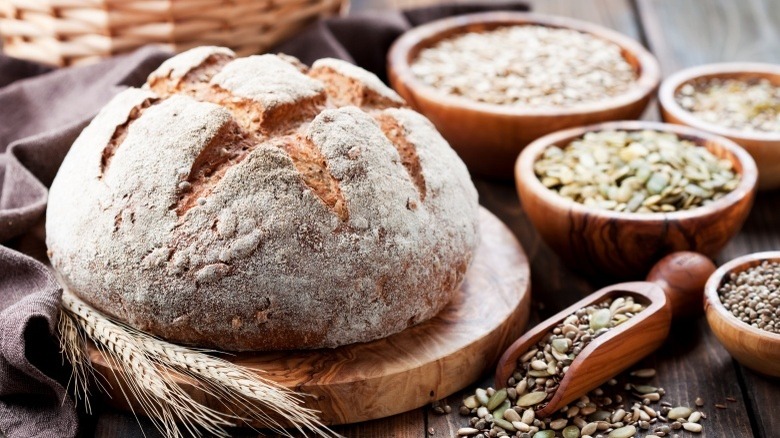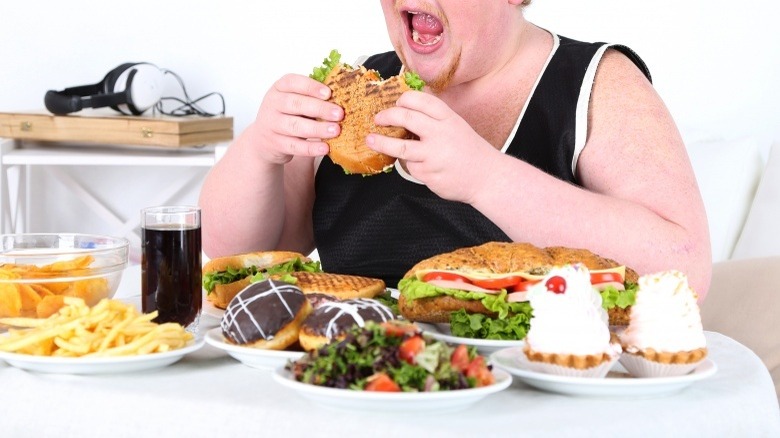What Really Happens To Your Body When You Go Gluten Free
Gluten-free. It hurts. It heals. It's harmless. It's horribly confusing.
This protein made up of the peptides gliadin and glutenin is found in grains such as wheat, semolina, rye and barley. It's known for giving bread its airy and fluffy substance and dough its sticky texture. But it's notorious for sending dieters, restaurateurs and the medical community into a tailspin.
Every time you eat a Cronut (or a turkey sandwich for that matter), an enzyme produced in your intestinal wall (tissue transglutaminase, tTG for short) breaks down gluten into its protein building blocks. As the proteins travel through your digestive system, they get reviewed for potentially harmful substances by the gut's immune system – much like TSA at the airport. If the body isn't sensitive or intolerant to gluten, the proteins are absorbed, and you get through the metal detector free and clear.
If the body is sensitive to gluten, the security system identifies the protein as a dangerous substance and produces antibodies to attack it. Bloating, constipation, and malnutrition ensue – again, much like at the airport. It is pretty widely accepted that Celiac disease patients (and to a lesser extent, non-celiac gluten sensitive patients) should strictly avoid gluten. It is, as of now, the only known treatment to help heal the small intestine.
For those of us who are self-diagnosed gluten-sensitive, or voluntarily gluten-free, what really happens to the body when you give up gluten? Because the jury is still out on the legitimacy of a gluten-free diet for better health, there are a lot of polarizing answers to this question. Here are some possibilities.
You could lose key nutrients
While gluten itself does not contain unique nutritional benefits, the whole grains that contain the protein often do. Wheat-containing products like sandwich bread and cereals are fortified with B vitamins and iron. But many gluten-free food options are not. Which means that, for people who eat a diet of cereal, sandwiches and pasta, wheat is the most nutritious thing they eat all day.
Andrew James Pierce, MS, RD, CSCS, in-house nutritionist for the app SugarChecked, warns that traditional gluten-free diets often rely heavily on highly processed and low nutrient-dense starches, such as white rice, potato and tapioca flours. Many of these foods are much lower in fiber and are usually not fortified with B vitamins or iron, unlike traditional wheat flour products. He says, "It is certainly not impossible to meet the fiber and other nutrient needs on a gluten-free diet. It just requires a higher level of diligence."
Diligence could come in the form of B vitamin-rich legumes, calcium-rich cottage cheese, iron-rich turkey, and a whole plethora of vitamin-rich fruits and vegetable.
You could gain key nutrients
To say the science is confusing is an understatement. Just as some studies say that you will lose key nutrients if you go gluten-free, others found that patients with celiac disease following a gluten-free diet actually consumed more calcium, magnesium, phosphate, zinc, folate, and vitamin C, while the other vitamins and minerals as well as fiber were equivalent. Yet another study evaluated the nutrient intake of children with celiac disease and that of non-gluten-sensitive children. They found that the children with celiac disease (consuming a gluten-free diet) consumed more calcium, vitamin B6, vitamin B12, and substantially more zinc.
You could have a calmer, happier stomach
Better digestion. Gluten-free diets are synonymous with this benefit. Many people who go gluten-free report having less abdominal pain, bloating, constipation or diarrhea. Whether you believe in gluten-free diets or not, it is scientifically proven that of all the carbohydrates, whole grains are the hardest to digest. Some cite the presence of phytic acid (blocks the absorption of minerals), enzyme inhibitors (catalysts for digestion), disaccharides (double sugars that are difficult to digest), and the fact that grains were not meant to be ingested.
Margaret Romero NP-C, an integrative nurse practitioner, finds most of her patients' stomach symptoms improve with a gluten-free diet, even if they don't have celiac disease. "If a patient has no signs or symptoms, I don't put them on a gluten-free diet. But even minor symptoms such as a little gas or bloating or persistent diarrhea/constipation, is more likely to be improved on a gluten-free diet," says Romero.
You could have a more upset stomach
Typically, gluten-free foods — especially processed gluten-free foods, do not contain as much fiber as grain-based foods. And according to a study in the Journal of Nutrition, more than 90 percent of Americans are not meeting the recommended daily amount of fiber.
Fiber keeps things running smoothly. It's the roughage that your body can't digest that helps bulk up your poop. If you don't get enough of it, you'll have a harder time making bowel movements, i.e. constipation. Thankfully, fruits, vegetables, potato skins and legumes are all great alternative sources of fiber.
You could experience anti-inflammatory benefits
Inflammation is the body's attempt to bring more nourishment and immune activity to a site of injury in the body. It's a healing response. The problem, however, is when inflammation persists without reason. Chronic inflammation is at the root of America's most popular illnesses – heart disease, cancer, Alzheimer's and a whole host of autoimmune conditions.
According to Romero, because gluten creates inflammation in the body, when one has an allergy or sensitivity, a significant reduction in symptoms is noticed pretty quickly. These can include rashes, GI issues such as IBS, autoimmunity, and pain/fibromyalgia.
You could go through withdrawal
One of the first things that members of Food Addicts Anonymous give up is gluten. They recognize that eating wheat tends to spark compulsive eating. Research has shown that self-assessed food addicts in Overeaters Anonymous were successful in losing weight by dealing first with physical craving and abstaining completely from their major binge foods (like wheat). Some food addicts cannot stop bingeing until they eliminate all wheat from their diet.
Dr. Leslie Korn, PhD, MPH, goes so far as to suggest that detoxing from gluten can be almost as difficult as getting off heroin. She has built a special niche for herself in the relationships between diet, chronic illness, and mental health. In her book, Nutrition Essentials for Mental Health: A Complete Guide to the Food-Mood Connection, she talks about the prominence of people with psychosis that are gluten-sensitive (50 percent according to one study). "Not good news, given so many of these individuals are homeless and eating at shelters serving gluten rich foods," Dr. Korn says.
You could increase your processed food intake
With a gluten-free diet comes plenty of pre-packed, sugar-packed, crunchy, crispy, ooey-gooey gluten-free treats. So it's quite easy to feel like your choices for processed foods are justified as soon as you see the gluten-free label.
Pierce puts it this way: "At the end of the day, a gluten-free cookie is still a cookie."
But not all people reach for the brightly colored boxes of gluten-free munchies. Some people find themselves spending more time in the kitchen, roasting vegetables, chopping salads and blending smoothies. This is evidenced by the droves of food bloggers out there sharing their journey and cooking up a storm of unprocessed gluten-free food.
You could protect yourself from leaky gut syndrome
The gut is lined with cells whose job it is to join together to form tight junctions. These are supposed to be the very selective parts of the gut that determine what comes in and what stays out. The "gatekeepers," if you will. They keep out pathogens, antigens and toxins, and welcome in nutrients and water.
But the gatekeepers are not infallible. If not treated properly, they develop holes that keeps them from doing their job. This allows microbes, toxins, proteins, and partially digested food particles to get through and flow freely into your bloodstream. This is what we lovingly call "Leaky Gut Syndrome."
Because gluten produces zonulin, a protein that directly impacts leaky gut, eating gluten could cause or exacerbate leaky gut. According to a study on this syndrome, continually eating gluten will keep your junctions open and your gut leaky. Your body may mistake your own tissues for gluten and remain in a chronic state of inflammation which could lead to a host of autoimmune conditions.
You could clear your head
Psh. Not likely if we keep getting conflicting advice on this subject, right?
There isn't a whole lot of scientific evidence to support it, but the anecdotal evidence is all over the internet: many people report clearer thinking after they give up gluten. The reason being? While they were ingesting gluten, they were experiencing "brain fog." Although there is no official medical definition, people describe it as feeling tired, lethargic, fuzzy-headed. And often, they didn't realize how bad they felt, until they gave up gluten, and started thinking much clearer.
One study published in the Journal Alimentary Pharmacology & Therapeutics found an increase in depression symptoms with a diet containing gluten. While another found that when they gave participants a pill containing gluten or placebo, there symptoms were more severe when they swallowed the gluten-containing capsule.
To gluten or not to gluten?
So what's a gluten-fearing girl to do? At the current war-torn state of the food industry, you're not going to get a clear answer. But if there's one thing that you can always rely on, it's yourself. Blindly eating whatever is within reach — without paying attention to its nutrition label or how it's making you feel — is setting you up for heartache and heartburn.
Does your Wednesday night spaghetti frequently end in tummy aches? Do you feel a lot better after eating a bowl of steel cut oatmeal than a bowl of cinnamon-swirled cereal? Then follow your stomach. It's trying to tell you what to do.









